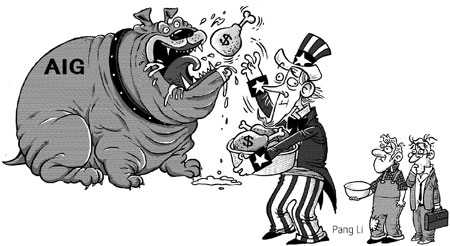
|
OPINION> Commentary
 |
|
Landmines hinder route to economic stability
By Zhou Bajun (China Daily)
Updated: 2009-04-08 07:47 The countermeasures dealing with the staggering global financial crisis differ from those during the Great Depression of the 1930s. Bailouts for battered financial institutions from the US government and other countries have been prompt. Many have issued whopping amounts of money and poured huge public funds into the plans, which have prevented the financial crisis from deteriorating. However, the financial institutions, the specific financial markets, and countries have mingled together, creating a mess that is far bigger and far more complicated than that of the Great Depression. Though the government bailouts have mitigated the crisis to avoid a doomsday catastrophe, economic restructuring has actually been delayed. This may exacerbate conflicts among all stakeholders. On March 15, American International Group (AIG), the largest insurer in the world and the recipient of a $170 billion bailout, announced it would pay $165 million in bonuses to the managers of its financial sector. AIG also revealed it had transferred $90 billion to American and overseas banks to fulfill contracts, all from the courtesy of the government bailout. On the same day, Chairman of the Federal Reserve Ben Bernanke was interviewed by 60 Minutes of the Columbia Broadcasting System (CBS) and released a guarded yet optimistic forecast for the US economy. I believe Bernanke would have cancelled or postponed the interview with CBS if he had known inadvance the AIG announcement. Bernanke acceded to the interview in a rare move for a Fed Chairman. In his words, he did so because he wanted to "directly talk" to the American people in this "special moment" in US history. What he wanted to tell the American people was that the US economy had dodged the risk of another Great Depression, and the recession might stop at the end of this year if the government could help stabilize the banking sector. He also urged, however, troubled banks to shed "toxic assets" and raise their capital adequacy ratio.
 He emphasized the importance of "political will" for the US economy to shake off the recession. He warned that the US's biggest risk is now the dearth of "political will" to reconstruct the financial system. He was wary that the political leadership and the public might abandon efforts to shore up the banking system. He also declared that only if the financial market and banking system were stabilized, would the economy be able to recover. It was a pity the AIG scandal eclipsed Bernanke's positive message. Although the bonuses to the managers and the payables to American and foreign banks from AIG were legally binding, they exposed how ridiculous unregulated market behavior can be. Both the US government and the public were outraged. Worse still, for Bernanke, was how the absurd actions of AIG and other battered financial institutions might squander the political will needed to reforming the financial system. The AIG landmine has inflamed the debate, exacerbating conflict between stakeholders. In this milieu, surmounting the crisis and reforming the economic structure will be further delayed. On February 10, US Treasury Secretary Tim Geithner and Bernanke jointly announced the Financial Stability Plan, aimed at sweeping away the toxic assets in order to stabilize financial market and urge banks to lend. The ambitious plan might cost more than $2 trillion, also drawing on private investors. However, it is proceeding at a snail's pace because the government cannot agree with private investors on the prices of "toxic assets". Bernanke is aware of the burdens on his shoulders to maintain stability of the financial system and promote the recovery of the US economy. As an economist, having profoundly researched the Great Depression, he should grasp how a recession could deteriorate into a depression, and how to prevent it. The financial crisis and economic recession in the US and elsewhere, however, can only be overcome through the market. If the irresponsible deeds like those of AIG bonuses continue, Bernanke's optimism may finally turn sour. The author is a senior analyst with the China Everbright Group. (China Daily 04/08/2009 page9) |